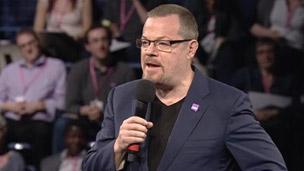Miliband: Government practising 'politics of division'
- Published
Ed Miliband told the People's Policy Forum the coalition was "dividing" the country
Ed Miliband has accused the government of "practising the politics of division", comparing their approach to the "rotten politics of the 1980s".
The Labour leader told an audience in Nottingham that the coalition was "dividing" the country by pitting the middle class against the wealthy and the public against the private sector.
He confirmed he would address an anti-cuts march in London on Saturday.
The protest is expected to be the largest since the coalition was formed.
Mr Miliband, who has previously been reluctant to say whether he would attend the TUC-organised event, said it was important that the "mainstream majority" opposed to the government's spending cuts programme made their feelings known.
'Paying the price'
Labour has billed Friday's policy forum event in Nottingham as the largest "listening exercise" ever undertaken by a British political party.
The party insisted the event was being attended by about 2,000 local residents rather than "handpicked" Labour Party activists but the audience also contained many party members and MPs.
Mr Miliband, who was introduced to the stage by comedian Eddie Izzard and former TV presenter Fiona Phillips, is seeking public input into the party's policy review - expected to be completed next year and to shape their platform for the next general election due in 2015.
Mr Miliband said the government's approach to tackling the country's economic challenges reminded him of the 1980s, with ordinary families having to "pay the price" for the banking crisis, benefit claimants being made to feel "resented" and areas of the country being pitted against others.
"I grew up in the 1980s. I thought the politics of the 1980s were rotten. The reason I thought that is they divided the country. I fear we are seeing our country divided again. I fear that this government is practising the politics of division."
Mr Miliband said the "common bonds" and institutions uniting communities, such as the NHS, libraries, Post Offices and Sure Start Centres, were "under threat" from the budget squeeze.
'Mainstream march'

Comedian Eddie Izzard introduced the Labour leader
Defending his decision to address a rally at the end of Saturday's anti-cuts demonstration in London, Mr Miliband said those taking part would include midwives, nurses, businessmen and off-duty policemen.
"These are not voices of people marginal to our country," he said. "These are voices of the mainstream majority in our country. The duty of my party is to stand up for that mainstream majority."
Tory MP Greg Hands has said the Labour leader has a responsibility to prevent Saturday's march becoming "a focus for disorder and law-breaking" and should "use his influence" with the trade unions to ensure this does not happen.
Speaking later to the BBC, Mr Miliband dismissed suggestions his presence would fuel accusations that he was too close to the unions after he was dubbed "Red Ed" by one tabloid newspaper following his election as leader.
"I think it would be quite wrong for me not to be talking to those people because many of them represent the mainstream of Britain."
He added: "I think the government will be making a great mistake if they somehow dismiss all of the people on that march as troublemakers or just 'the same old people'. They are not. What you are going to see is a diversity of people from across our country."
Friday's public event was the next stage in a wide-ranging policy review which Mr Miliband says is needed after Labour's 2010 election defeat.
Mr Miliband defended his reluctance to set out a "grand vision" for Labour at this stage, saying he did not want to repeat the mistakes of Nick Clegg and have to backtrack on key pledges - saying that "Cleggmania had turned into Cleggphobia".
"We are not going to make promises we cannot keep. To do so would just increase the cynicism more."
'Policy den'
As well as answering questions from members of the audience, Mr Miliband responded to questions via Twitter - mediated by the TV presenter and Labour peer Baroness Bakewell.
In addition to the Q&A, Mr Miliband, shadow chancellor Ed Balls and other senior figures later took part in workshops to discuss issues such as job creation, economic growth and social care while people are being encouraged to contribute ideas through a "policy den".
"Our next manifesto will be as good as the ideas that come from the public," Mr Miliband added.
The Conservatives have sought to ridicule Labour's listening exercise, with Mr Cameron mocking the Labour leader for saying the party had a "blank sheet of paper" on the economy, education, health and other important issues.
They have also accused the opposition of being "in denial" about the size of the budget deficit they left behind and of planning far-reaching cuts at the last election but not being prepared to give any details.
- Published23 March 2011
- Published13 December 2010
- Published27 November 2010